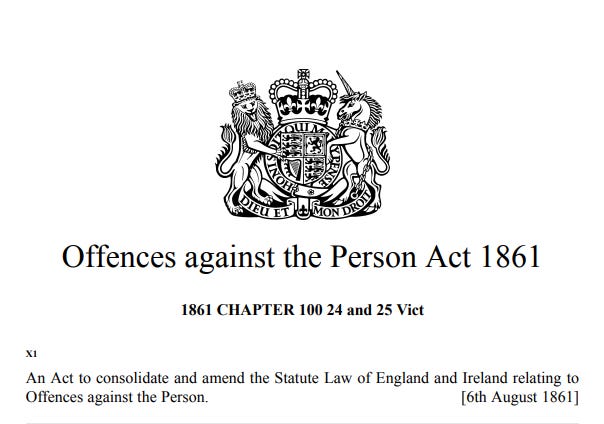Two small liberal steps forward, against the gale of illiberalism
Why the parliamentary votes on abortion and assisted dying are welcome - and significant.
The first thing to assert is that no law has yet been changed by the recent parliamentary votes on abortion and assisted dying . The applicable law today is as it was last week. Votes on bills as they go through parliament do not have legal effect until that bill, by regal legal magic, becomes an Act of Parliament with royal assent.
But.
The parliamentary votes on abortion and in assisted dying are significant and, from a liberal perspective (and this is a liberal legal and constitutional blog), welcome.
They are significant because they (well) signify a change - a break with the hitherto settled law and policy in these areas.
*
In respect of abortion, the key provisions currently in force are in this Victorian legislation, from 1861.
Removing these provisions from the statute books does not, notwithstanding some media coverage to the contrary, legalise abortion. It will still be a criminal offence for a second person to perform an unlawful abortion.
The removal of these provisions, however, would de-criminalise self-induced abortions, where there have been some extraordinarily moving recent cases where the offence has been prosecuted - for example here:
Though the offence itself was a serious one, and crossed the custody threshold, this was, as we said at the hearing of this appeal, a very sad case that called for compassion, not punishment. And it was one where no useful purpose was served by detaining Ms Foster in custody.
After assessing harm and culpability, our provisional starting point was one of three years imprisonment, which was reduced to one of 18 months having regard to mitigation, and then to one of 14 months after giving Ms Foster 20 per cent credit for her plea. The length of this sentence meant it could be suspended and we considered that it should be suspended. We have already referred to the exceptionally strong mitigation. Rehabilitation had already been achieved. Ms Foster presented no risk to her family or the wider public, and there was no prospect of a repetition of this offence. By the time of the hearing before us, it was obvious that custody had had a severely detrimental effect on Ms Foster and on her family. The rehabilitation activity requirement of up to 50 days provided her with an opportunity for various interventions in relation to the offence, designed to assist her, including counselling.
It was monstrous that the defendant in that case, and in similar cases, was ever prosecuted. But such prosecutions were (and are) always possible while the 1861 offences remained (remain) the law of the land.
*
In respect of assisted dying, there are - of course - different views, and many of those opposed to its introduction are sincere and serious.
The perspective of this blog, however, is based on two points - one in principle, and one practical.
The principle is that of self-autonomy: that, as far as possible, it should be for the individual to make decisions about their own lives.
And so the preferences of someone facing an otherwise unavoidably agonising death should be accorded respect and, if possible, given effect.
There is the potential for misuse for others, but this is not itself a reason in and of itself to deny the preferences of someone facing an otherwise unavoidably agonising death to end their own life on their own terms.
It is instead an argument for preventing those abuses, and not for denying the choice to those who want to make that decision for themselves.
The practical point - which often seems missed in the discussion about the proposals - is the that the status quo is itself unsatisfactory, and based on the uncertain but generally widening discretion policy of prosectors on whether to prosecute. At the moment assisted dying to can and does escape prosecution but at the cost of unimaginable legal anxiety to those concerned.
If this proposal - set out in this private members bill which, as Ian Dunt explains, has been impressively piloted through the Commons by Kim Leadbetter MP - is defeated in the House of Lords, as some opposed campaigners are now urging, then this dire status quo will continue - and without any of the safeguards in the bill.
*
Given the force of the illiberal winds blowing through the United Kingdom and the United States, and elsewhere, the sensible decriminalising of people facing the horrible decisions and actions set out above, is a boon.
One may have moral views against abortion and assisted dying, but the intervention of the criminal law in these situations often makes dreadful personal situations far worse.
Neither change is yet on the statute book - and there are those who will work hard to make sure they do not get enacted.
But for the House of Commons to even pass such measures in draft legislation is an important moment.


Thank you for this informed post clarifying many of my misconceptions. Both situations, assisted dying and abortion, involve so much agony that it is a very welcome idea to relieve as much unnecessary suffering as possible for everyone concerned. These decisions are personal and can only be decided by the appropriate medical personnel in consultation with the 'patient'. We are here to support each other, not to inflict additional maximum hurt when the law can help, inform and protect everyone caught in these tragic situations.